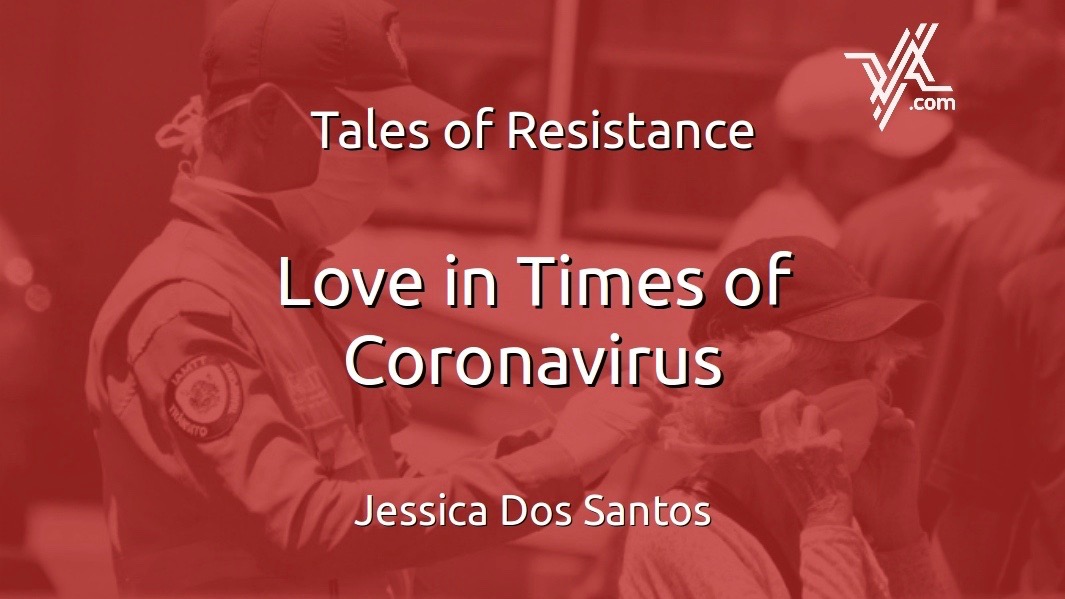It was the second week of March. The coronavirus had been raging on for months in China, for weeks in Europe, and had arrived in Latin America. Meanwhile, in Venezuela, a media campaign focused on prevention was underway. State media would play a jingle all the time asking us, in the country where kisses and hugs are the only thing never lacking, to greet each other without physical contact:
“If you see a friend and want to greet him: a military salute. If you want to hug him but can’t: bang your elbows. And if you find a friend you haven’t seen in a while: greet him like you’re Japanese” [translator’s note: in Spanish it rhymes]. We were all walking around humming it in our heads. However, every time we saw a friend we would smother them anyway. One way or another, we refused to accept that the virus would also land here.
On the morning of Friday the 13th, a friend who works for the state warned me that an announcement was imminent suspending work activities and imposing a social quarantine [two days later a nationwide quarantine was imposed]. Following her warning, and before knowing what measures would come into effect, I went out to buy some stuff to ensure I could survive at home.
Plenty of complex scenarios were flying through my head. In Venezuela the public healthcare system is in very bad shape and sanctions would not allow for the import of the supplies we need to tackle this crisis. And on a smaller scale, in Venezuela shopping is always a small time operation. Therefore no household would have supplies, food and otherwise, to endure a long period and most would not have the money to afford it all at once.
The scenarios grew more catastrophic in my head. And some in fact came to pass. The US not only failed to remove the blockade but imposed a new round of sanctions. The IMF rejected a desperate plea from the Venezuelan government. We had to rely on the World Health Organization, the Panamerican Health Organization, Russia and China to get the necessary medical kits. And to top it all off, international oil prices fell below $30 a barrel, retailers hiked the prices of the most in-demand products (face masks, alcohol, sanitizing gel and food). Nevertheless, the government was up to the task. It sprung into action immediately and imposed “drastic” measures to avoid the mistakes committed by other countries and prevent the implosion of our beleaguered healthcare system. And more importantly, the people did not fail to deliver on their end.
Within days, not only was the collective quarantine respected at a 90 percent level, according to the government, but we also moved all our love to our telephones, social media, working from home, taking care of one another.
Schoolteachers, mostly women, created study plans in record time so kids could continue learning from home, in spite of the difficulties surrounding our telecommunications, especially outside large urban centers.
Seamstresses from popular organizations were quick to voluntarily produce and distribute face masks made from cloth.
A thousand formulas to produce disinfectant gel were shared online.
Leaders from different popular power organizations created security protocols so that the [CLAP] food box would be delivered to every household. Likewise, cooks in public schools have kept the “School Food Program” active, cooking and having parents pick up food for their kids. In smaller villages they even deliver the food themselves.
Doctors started giving video conferences and online consultations free of charge.
Chefs have shared their best recipes, psychologists haven’t stopped giving useful advice, and the unparalleled Venezuelan humor has been out in all its glory to help get us through this situation.
Our people, stigmatized by the mainstream media, did not go out killing each other in stores. And contra the vulgar stereotype that was erected, Venezuela was not the country where toilet paper ran out.
Freelancers [such as myself] and informal economy workers, including an endless number of street vendors, taxi drivers, etc., have our incomes frozen. But we know we won’t starve to death, because solidarity is alive and well in every corner of the country.
The coronavirus represents a very challenging and dangerous situation in our current context and many will die in no small part due to the impact of deadly sanctions. But Venezuela has learned plenty of historical lessons over the past 20 years. We have survived an oil strike, coup attempts, Chávez’s death, violent street protests, massive power blackouts, an economic blockade, and even the imposition of a second [self-proclaimed] “president.” We will be able to handle the coronavirus. We can handle anything. And so can you. We shall overcome!
Jessica Dos Santos is a Venezuelan university professor, journalist and writer whose work has appeared in outlets such as RT, Épale CCS magazine and Investig’Action. She is the author of the book “Caracas en Alpargatas” (2018) and a university professor. She’s won the Aníbal Nazoa Journalism Prize in 2014 and received honorable mentions in the Simón Bolívar National Journalism prize in 2016 and 2018.





